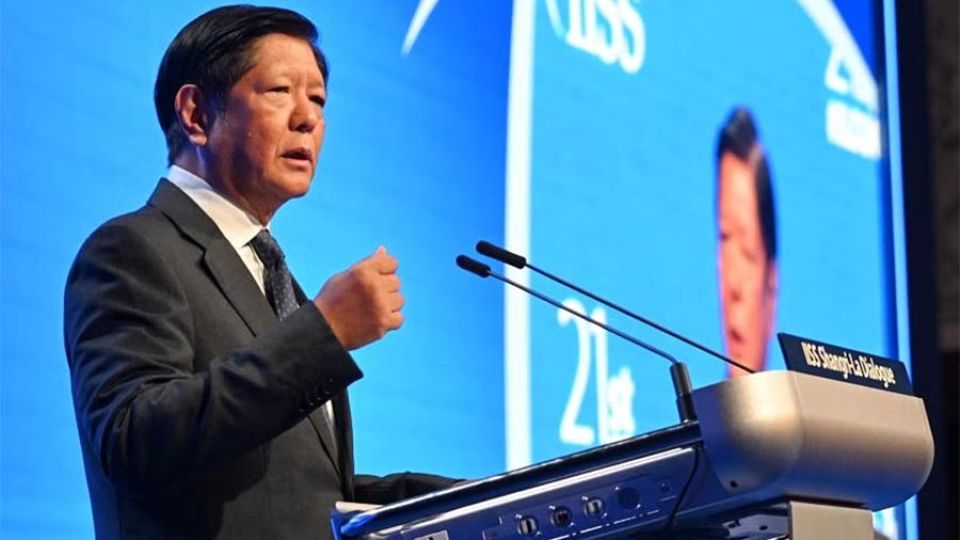May 31, 2024
SINGAPORE – Any Filipino serviceman or citizen killed by a wilful act in the South China Sea comes very close to what the Philippines defines as “an act of war” – to which his country will respond accordingly, said Philippine President Ferdinand Marcos Jr on May 31.
“We had already suffered injury, but thank God, we have not yet gotten to the point where any of our participants, civilian or otherwise, have been killed,” said Mr Marcos, using the most strongly worded language to date in reference to an escalating maritime row with China in the South China Sea.
“But once we get to that point, certainly we would have crossed the Rubicon. Is that a red line? Almost certainly it’s going to be a red line,” he added, in response to a question from the floor after his keynote speech at the 21st Shangri-La Dialogue held in Singapore.
Mr Marcos had in April said that any Filipino death in the event of aggression by a “foreign power” in the South China Sea could invoke a defence treaty between the Philippines and the US.
In his keynote speech, Mr Marcos once again referred to the defence treaty with the US, saying: “Our treaty partner, I believe, also holds that same standard for when the joint actions will be undertaken in support of any such kind of incident in the Philippines.”
In March, China’s coast guard fired a water cannon on a Philippine vessel, which the Philippines said resulted in injury and property damage.
Responding to Mr Marcos’ speech, Chinese Lieutenant-General He Lei, former vice-president of the Academy of Military Sciences, told reporters: “If the death of one person in one accidental clash is enough to trigger a war, then I think this country is belligerent.”
In the past year, Manila and Beijing have been embroiled in heated stand-offs over their longstanding competing claims in the South China Sea. Earlier in May, the Philippines accused China of building “an artificial island” in a disputed area and deployed a ship “to monitor the supposed illegal activities”, with two other vessels in rotational deployment in the area.
Beijing claims jurisdiction over most of the South China Sea, where more than US$3 trillion (S$4 trillion) of global trade passes through annually, including parts claimed by the Philippines, Brunei, Malaysia, Taiwan and Vietnam.
Since assuming office in 2022, Mr Marcos has taken a tougher line than his predecessor towards China’s actions, while backed by the US, as well as Japan and Australia.
While Mr Marcos did not explicitly name China in his keynote speech, he called out the “assertive actions that aim to propagate excessive and baseless claims through force, intimidation and deception”.
Citing a 2016 international arbitral tribunal that ruled that China’s claims had no basis under international law, Mr Marcos said: “The lines we draw on our waters are derived not from imagination, but from international law.”
But he also noted that China’s influence over the security situation and the economic evolution of South-east Asia is “a permanent fact” – one to be balanced by the US’ “stabilising influence”.
Asean nations, he said, need to “resoundingly reject misguided interpretations” that paint the region as a “mere theatre of geopolitical rivalries”. It is not a mere bystander to unfolding world events, but main characters in the collective story, he added.
During the question and answer segment, a Chinese delegate asked Mr Marcos whether the Philippines was weakening the concept of Asean centrality and previous commitments to resolve regional disputes within the bloc.
Mr Marcos, he said, was not considering other parties’ “comfort levels and risks ruining the region’s long-earned long-lasting peace”. To that, the Philippine leader said the South China Sea is now a world issue as much of global trade passes through it.
Mr Marcos’ speech marks the first time a Philippine head of state delivered the keynote address at the annual defence summit, and comes as Singapore and the Philippines mark 55 years of diplomatic ties.
Earlier in the day, Mr Marcos met President Tharman Shanmugaratnam, Prime Minister Lawrence Wong and Senior Minister Lee Hsien Loong.
It also marks the opening of the three-day regional security forum, organised by the International Institute for Strategic Studies and held from May 31 to June 2 at the Shangri-La Hotel. The summit is attended by defence ministers from around the world, including the US and China.
Earlier in the day, US Defence Secretary Lloyd Austin and his Chinese counterpart Dong Jun – appointed just five months ago and who was sitting in the audience when Mr Marcos gave his keynote address – met on the sidelines of the summit in a 75-minute meeting that ran longer than scheduled.
Both men underscored the importance of stepping up military-to-military communication, which had been cut after then US House Speaker Nancy Pelosi visited Taiwan in August 2022.
The meeting between the defence chiefs comes after US President Joe Biden and Chinese President Xi Jinping agreed to resume military-to-military talks when they met in San Francisco in November 2023.
Mr Austin is scheduled to headline the first plenary session on June 1, during which he is expected to outline the US’ strategic partnerships in the Indo-Pacific. Admiral Dong will deliver an address at a plenary session on China’s approach to global security on June 2.
Meanwhile, Indonesian President-elect Prabowo Subianto is due to make a special address in the afternoon of June 1.

